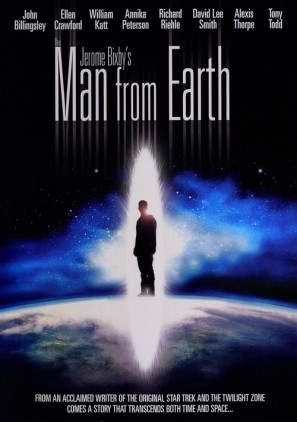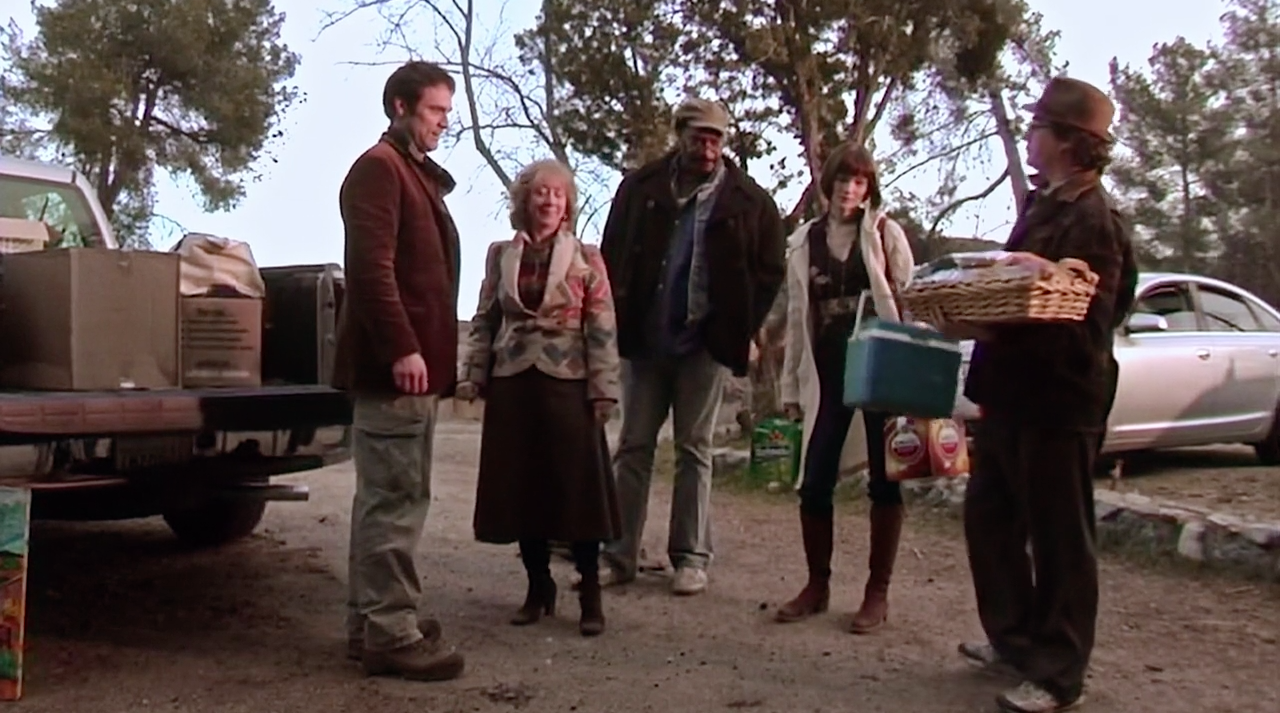

“Time… you can’t see it, you can hear it, you can’t weigh it, you can’t measure it in a laboratory.”
“Clocks measure time.”
“No, they measure themselves. The objective referent of a clock is another clock.”
“All very interesting, but what has it got to do with John?”
“He, he might be a man who… lives… outside of time as we know it.”
The Man From Earth is an uneven viewing experience, but at the very least is thought provoking. Filmed on a low budget, it plays out like a sci-fi 12 Angry Men; by that I mean that the film takes place entirely in one location and consists largely of conversation, and has a single brainy concept that the characters talk about for the entire length of the film. What begins as an impromptu retirement party for professor John Oldman (David Lee Smith) turns into an evermore serious interrogation when he engages his colleagues in a thought experiment: what if a Cro-Magnon man had a body that didn’t naturally die like everyone else’s, and had survived through to the present day? Unfortunately, instead of exploring this question legitimately, the narrative tries to force itself into something grander than it is.
Early on, Oldman gives up the game, and reveals that he chose not to sail with Columbus because he was still unsure if the world was flat or round; in other words, he himself is the man from his thought experiment. His interlocutors are an expert bunch—Harry (John Billingsley), a professor of biology; Edith (Ellen Crawford), a professor of art history; Dan (Tony Todd), an anthropologist; Sandy (Annika Peterson), a historian and John’s romantic interest; Art (William Katt), an archaeologist; and Art’s student Linda (Alexis Thorpe). The professors each give their off-the-cuff response, unsure how seriously to take him, but John has legitimate answers for all of them. Eventually, each of them begin to take him seriously, though they realize there is no way to prove the validity of his claims.

The flow isn’t quite there; after revealing that he simply owns a van Gogh painting in an early scene, he then casually asserts that he knew the man. In fact, he knew other famous historical figures—Hamurabbi, the Buddha, etc. He also has ten doctorate degrees. It takes very little for the group to shift from engaging with a hypothetical to accepting John speaking in the first person. Each of them has a chance to press his claims from their expert perspective. Later, Art calls Dr. Will Gruber (Richard Riehle) to come and listen to John’s story. Will questions whether John feels guilt over having outlived everyone he has ever loved.
The conversation gets to its most bizarre extreme when they ask him if he knew any biblical characters. He says that he did, but tries to dodge the question. When pressed he reveals that his attempt to take Buddhist teachings to the Roman empire resulted in the inspiration for the story of Jesus (he was tied, not nailed, to the cross; and besides, he doesn’t scar. The Buddha taught him to slow his metabolism so he could appear dead and then reawaken). Emotions spike and Edith, a devout Christian, begins crying and claiming that his story has gone too far in its blasphemy. Will demands that John admit his story is a hoax by threatening to have him involuntarily committed to a psychiatric evaluation. Upon reflection, John says that his tale has come to an end—the gig is up—but Sandy knows that John would never lead people on the way he did if he was not telling the truth. There is a bit of a twist at the end that feels tacked on and cheap, but technically works within the rules the film set for itself.
The Man from Earth appears smart, but is what many would deem “pseudo-intellectual.” Fans of Dan Brown will love the way it plays with Christian history with abandon. It would have been a much more fulfilling story to simply explore how a man would adapt across the millennia to fit in with different cultures, to see how scientific understanding developed, and how he would protect his longevity. There are a few interesting digressions, like when he said he had faked being his own son to avoid having to find references, or when Dan considers how the Hopis view time, but for the most part we are swept up in the fact that John was friends or neighbors with every notable person in history and was also the person of Jesus himself.

Moving on from the conceptually interesting yet poorly executed premise, the film really should just be a play.1 There have been plays adapted to the screen (Glengarry Glen Ross, Proof) that have more action than this. And I don’t mean violence and car chases. I mean things like eating food, playing a board game, walking. Shooting in one location doesn’t mean the film has to be so visually boring, plenty of great films have been made within a limited physical space—Coherence, My Dinner with Andre, Tape, to name a few.
As a piece of cinema, it’s passable at best, but the premise is interesting to ponder (again though, the execution went off the rails), and science fiction is one of the toughest genres to do well in film, let alone doing it on a tiny budget and without any special effects. The film garnered enough acclaim through torrenting that the director and two of the actors reprised their roles for a sequel in 2017, The Man from Earth: Holocene.
1. The director actually did adapt the film to the stage in 2012.